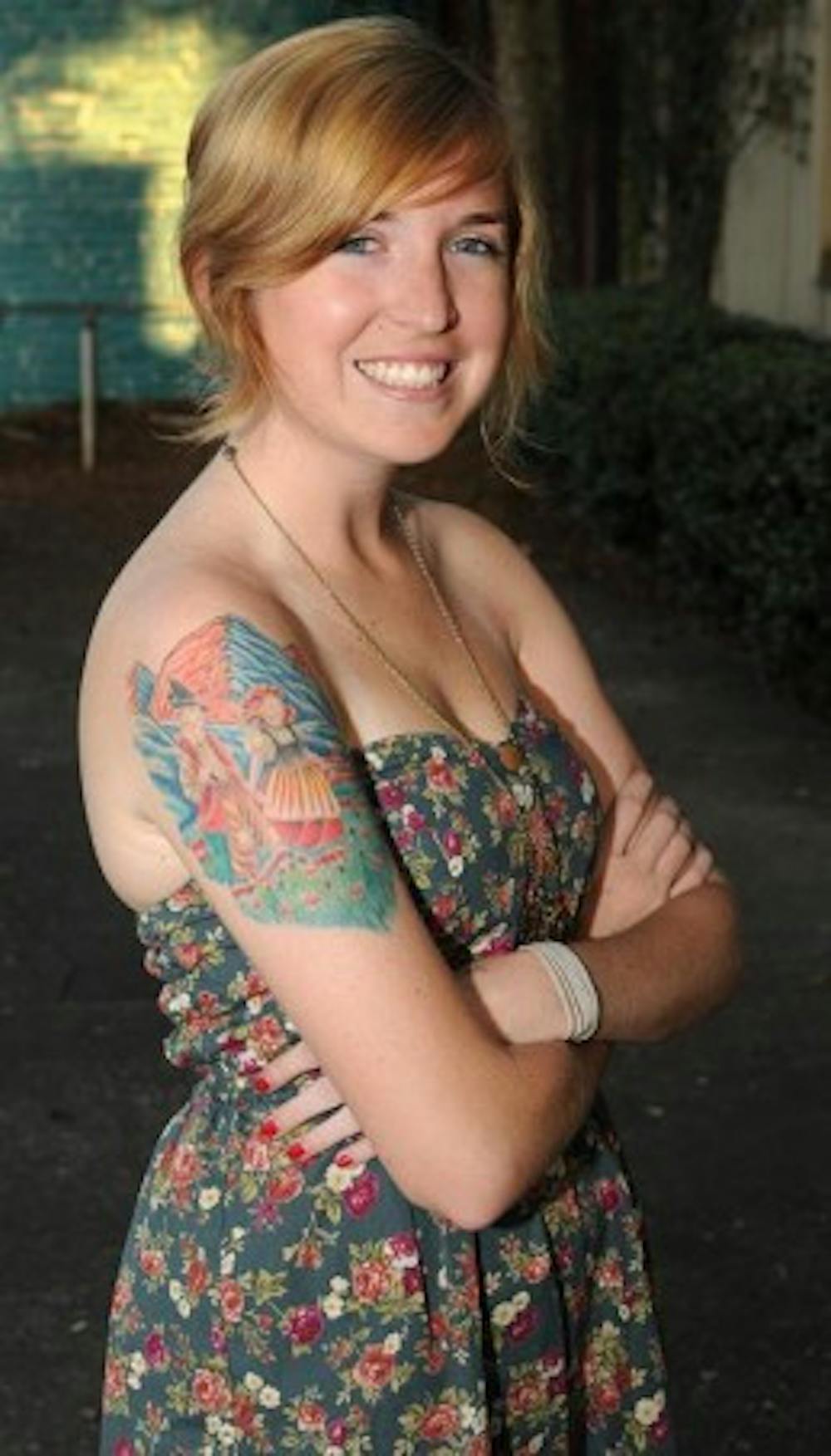As students permanently ink their bodies, their method of self-expression may affect their future careers - a fact that some take into consideration. The sleeve of tattoos that friends see will also be visible to employers.
Bailey Parke, a public relations senior, has six tattoos and plans to get more, she said.
"I got my first tattoo a couple months after I turned 18," Parke said. "I feel weird, but I constantly come up with ideas of tattoos I want."
The number of tattoos she has comes down to money and knowing her limit, she said.
"I've always been kind of the way I am - very into music and surrounded by people with tattoos," she said. "I'm very lucky to have accepting parents."
Parke said that when she worked for UF, her first job in college, no one seemed to care about the piece on her arm.
"That was my first eye-opening experience with tattoos in the workplace," she said.
While working at a day care in a Catholic school, Parke said it was the first time she felt conscious of her tattoos. She covered them up as well as she could and did not mind hiding them.
At her new child care job, the school has no problem with tattoos or clothing she wears, she said.
She said she wants to work in the music industry, a field in which she feels tattoos are acceptable.
While interning for Superfly Productions in New York City this past summer, one of Parke's coworkers called her "tattoo girl," but it was a very casual and accepting work environment. She never got any negative feedback.
"It has been on my mind that I will be judged," Parke said. "I feel that if someone doesn't want to hire me because of my tattoos, I don't want to work for them."
She has worked very hard in college, so she can be picky about the job she wants, Parke said.
"It's just the way I express myself, and I hope that people can appreciate that," Parke said. "All of my tattoos are meaningful to me."
Nadene Francis, assistant director of public relations for UF's Career Resource Center, said some students with tattoos come in with concerns about finding a job or interviews.
"Candidates should be judged on their ability to do the work," Francis said.
Employers should be more concerned with a person's skill set, but people are visual too, she said. For example, she doesn't think she's ever seen an anchorman with a tattoo that is visible from the neck up.
"There are just a few standards where they're not acceptable," Francis said. "It just depends on the field."
Francis said she asks the students about their level of comfort interviewing with their tattoos. She advises students to think of company expectations ahead of time.
Several companies still don't allow a 5 o'clock shadow and require closed-toe shoes for women, Francis said.
"There may be some adjustments to come for job seekers," Francis said.
Francis said she recently had a conversation with an employer who recruits at UF. The employer had a lunch engagement with a person who had visible tattoos.
The employer was surprised that the person would have such noticeable body art, and this framed their decision of the person. Francis said this might have been a generational issue.
Tracey Landgraf, an UF sophomore, has four tattoos on her body. She started to get tattoos after her dad and sister got them.
"I like to draw things, so the idea of having one of my own creations as a tattoo was appealing," Landgraf said.
She is open to the idea of getting more tattoos, but she is not committed to a new one just yet, she said. After getting her first tattoo on her back, her other tattoos are in more visible spots.
"I liked the idea of having tattoos that I could see," Landgraf said. "Yet, they're still all in places that I could hide with either an accessory or a shoe."
She said she did take her future career into consideration, but she doesn't think her tattoos will be a problem because of their placement.
"Even if it's an unfair reaction, I feel I would be judged on having large and visible tattoos," Landgraf said. "However, thanks to our generation, tattoos are becoming more acceptable."
Robert Barnes, co-owner of Anthem Tattoo Parlor, said you can see a change in the acceptability of tattoos in the workplace. They are losing their stigma.
"I know doctors that have sleeves," Barnes said.
Barnes said about 30 percent of his clientèle will come in with issues about placement.
"People are still apprehensive getting them where they're going to be seen a lot," Barnes said.
It goes back to when there were two types of people who had tattoos: sailors and criminals, he said. Sailors were associated with rowdiness, and criminals' tattoos showed that they had served time.
"As the baby boomers get older, it's not looked upon as it once was," he said. "I don't think it's going to be thought of as anything weird."
Barnes said tattoos no longer stand out as much, whether they are on a mechanic or a waiter.
"It's like wearing a shirt with a picture on it," he said. "It just doesn't come off."






